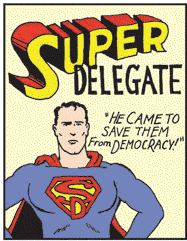WEST LONG BRANCH, N.J.–The 2016 election has seen vast increases in voter turnout, especially among youth voters. But with superdelegates dominating the scene, are young voices like ours truly being heard?
The issue of superdelegates trumping out the votes of the people is not a new one. When Jimmy Carter won the Democratic nomination in 1976, he was an outsider to Capitol Hill. In an effort from “high-ranking” Democrats, the idea of a superdelegate was introduced in 1982 and implemented by 1984.
This raises an important question: how are superdelegates still effecting us now, 32 years later?
The Democratic Party continues to separate their delegates into two categories: pledged delegates and unpledged superdelegates who are allowed to change their vote up until the Democratic National Convention in July. According to Nancy Unger, associate professor of history at Santa Clara University, superdelegates in the 2008 election individually held the power of roughly 10,000 democratic votes. This uneven distribution of power, she argues, is hypocritical of a democratic system that embraces the idea of “one person, one vote.”
According to CNN, the Republican Party also utilizes superdelegates. However, they only account for 7 percent of the vote and “must vote in accordance with their state primary outcomes.” Whether your ideology aligns with the conservative party or not, you have to admit that it seems to be a more logical approach. The method offers a more honest overview of how conservative voters are responding to candidates as they cast their votes during the primary season.

What happened in terms of delegate allocation in Washington State is a perfect example of how “undemocratic” the Democratic Party is during primary season. Senator Sanders won Washington’s caucus on March 26 with 72.7 percent of the vote, awarding him 74 delegates. However, the majority of the state’s 17 superdelegates have publicly stated they fully intend on putting their vote toward Clinton.
There is a feeling of betrayal sitting within those unhappy with the current political climate. Monmouth junior Erin Comiskey echoed a similar sentiment during a discussion about the current situation Sanders finds himself in.
“Although Sanders has been seen as the underdog, [he] has been neck and neck with Clinton in terms of polls, and often has Clinton by a few points,” said Comiskey. “However, despite these polls, delegates are still favoring Clinton, and this does not reflect what the American people want.”
In article for The Seattle Times, Jim Brunner reported that “in a barrage of social-media posts, emails and phone calls, Sanders backers have harangued Washington superdelegates, demanding they shift their allegiance to the Vermont Senator.” Many feel that their elected officials are betraying them as they side in opposition to the majority vote of the American people.
There is only a 250 pledged delegate difference between the Clinton and Sanders campaigns. With a total of 291 Democratic delegates at stake, a majority win for Senator Sanders has the potential to pull him ahead of Clinton. Before Sanders supporters get excited, it is worth noting that 44 of those delegates are unpledged superdelegates who in all likelihood may cast their vote for the former Secretary of State.
The reason for Clinton’s supposed “massive lead” over Sanders is due to superdelegates–Clinton currently sits at a 438 lead in that respect. So, should Sanders pick up a win in New York, it’s questionable as to whether or not he’ll actually be awarded the corresponding superdelegates.




